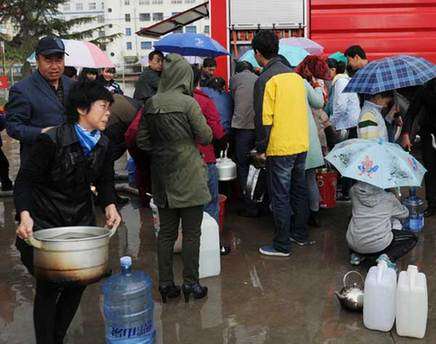兰州市“4•11”局部自来水苯指标超标事故应急处置领导小组副组长郑志强4月13日说,经开挖探坑的方式调查,调查组已查找到了导致水体苯超标的方位。根据环保专家现场初步分析判断,周边地下含油污水是引起自流沟内水体苯超标的直接原因。
请看相关报道:
 |
|
Residents line up to get water in Lanzhou, Gansu province, on Saturday. Experts and residents have raised questions over the delayed response and lack of timely information from authorities and the water supplier. Photo by Xue Chaohua / China Daily |
As local authorities in Lanzhou, Gansu province, continued to investigate the city's tap water contamination, experts and local residents have raised questions over the delayed response and lack of timely information from authorities and the water supplier.
甘肃省兰州市政府继续对该市自来水污染事件展开调查,专家及当地居民对官方和自来水厂的延迟回应和消息发布不及时提出质疑。
此次兰州自来水污染(tap water contamination)指部分地区的自来水苯指标超标(hazardous levels of benzene)。此次事件的原因是兰州威立雅水务公司两水厂之间的自流沟(duct between two water works)内水体受到了污染,并初步查明周边地下含油污水(residual oil contaminated underground water)是引起自流沟内水体苯超标的直接原因;而自流沟周边地下含油污水形成的原因为1987年一渣油罐物理爆裂(residual oil tank explosion)事故和2002年一出口总管开裂着火(a fire in the residual oil pipeline)。
近几年,有关水污染的事件屡有报道,去年曾有报道称山东部分企业将未经处理的污水(untreated wastewater)通过高压水井(high pressure water injection well)排到地下,造成地下水严重污染;2012年广西还曾发生严重镉污染(cadmium contamination)事件,一度影响威胁龙江河沿岸和下游300多万民众饮用水安全。
近几年因为水源的主要污染物(major pollutant)从原来的重金属(heavy metal)变成如今更难过滤的有机化合物(organic compounds),致使原来使用的活性炭(activated carbon)等物理处理方法(physical treatment)无法发挥功效,自来水工厂只能采用化学处理方式(chemical treatments)来净化水源(purify the water)。
相关阅读
(中国日报网英语点津 Helen)
点击查看更多新闻热词
